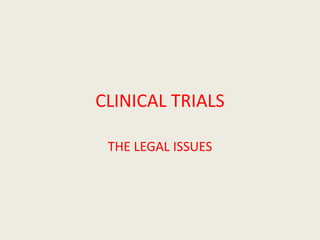
Clinical trials legal issues
- 1. CLINICAL TRIALS THE LEGAL ISSUES
- 2. Clinical Trials – The Process • Today, a large number of clinical trials are conducted across various countries and participant profiles and is a lucrative multi-million dollar business. • A clinical trial is conducted according to what is known as a protocol. A protocol specifies the reason for conducting the study, the drugs, dosages or intervention(s) to be studied, defines the target participant group(s), the entire project plan and schedule of the study, length of the study. • Before a clinical trial starts, it needs to be registered with the appropriate governmental authority. • Apart from all basic details regarding the clinical trial, approval from the appropriate Ethics Committee is required to be submitted for registration.
- 3. Clinical Trials – The Process • Only after registration of the clinical trial can the research team start to recruit human subjects for participation. Recruitment of Human participants needs to follow certain guidelines based on what is called ‘Informed Consent’. • A cardinal rule is that participation is absolutely voluntary and an informed consent document needs to be given to the prospective participant with all relevant information so that the volunteer can make a free and informed choice to participate. • After this, the actual clinical trial starts and at the end the findings are published and a new process starts for approval of the intervention for sale and marketing. • Here again, it is important to note that the findings need to be published in accredited international journals of medicine.
- 4. Clinical Trials – The Issues • Clinical trials, while an invaluable process in the development of new drugs and medicines, carry a lot of risks. There have been direct correlations between clinical trials and deaths of participants. Being a lucrative business, there is temptation to cut corners by the stakeholders involved. Hence, there is a need for laws regulating the field of clinical trials. • In India, the clinical trials are regulated by the Drugs and Cosmetics Act, 1940 and its corresponding Drugs and Cosmetics Rule, 1945. In 2007, the registration of clinical trials was started in India but the registration was voluntary until 2009 when it was made mandatory. • Three amendments were made to the Drugs and Cosmetics Rule, 1945 in the year 2013 and Rules 122DAB, 122DAC and 122DD were inserted. These new rules dealt with compensation to victims of injury caused by clinical trials, specifications for prerequisites to be completed before licence can be given to start clinical trials and mandatory registration of ethics committees respectively.
- 5. Clinical Trials – The Issues • As clinical trials are a long drawn out process, they are prone to abuse at multiple points. Types of abuses include improper application and registration, approvals given without proper vetting, bypassing mandatory steps though manipulation of data, not following rules related to informed consent, fudging of results, and non-disclosure of results. • In 2013, the Supreme Court of India halted the global clinical trials of 162 drugs and ordered the government to provide more information regarding the approval process before they can proceed. Health Right Forum, the petitioner in the case alleged that clinical trials of new chemical entities (NCE) or new drugs were being conducted without proper protocol and that companies were taking advantage of poor people.
- 6. Clinical Trials – The Issues • In 2014, on a petition by Swasthaya Adhikar Manch, the Supreme Court asked the Government to ensure that clinical trials are allowed only after ascertaining that new pharmaceutical compounds are innovations over existing drugs and are really needed in India. The government should to the extent possible, ensure that their potential benefits outweigh their risks and should ensure that people are not treated like ‘guinea pigs’ and immediate compensation should be paid for patients who died or had been adversely affected by the effects of the drugs tested. The three parameters of innovation, safety and need for India have to be kept in mind before approving any clinical trial
- 7. Clinical Trials – The Issues • Despite the amendments to the Drugs and Cosmetics Rules in 2013 which tightened the regulatory framework regarding compensation to affected participants and mandatory registration of ethics committees in India, the regulatory framework is still weak and enforcement lax. The Drugs and Cosmetics (Amendment) Bill of 2015 is yet to see the light of the day. In a very recent news report dated 5th February 2017, it is alleged by the National AIDS Control Organization that a clinical trial for a homeopathy drug to cure AIDS is being conducted by the Government Homeopathic Medical College in Hyderabad without registration and without following any protocols. This shows that the problems just don’t go away. With hundreds of clinical trials being registered and others being conducted on the sly, and the huge monetary stakes involved, ethics and qualifications of the players involved are the two paramount qualities that are the need of the hour.
- 8. Bibliography • Books Referred:- • 1. DR. NANDITA ADHIKARI, LAW OF MEDICINE (Dr. Ishita Chatterjee ed., Central Law Publications, Fourth ed. 2015). • Internet Sources:- • 1. Glossary of common site terms (Jan. 2017), https://clinicaltrials.gov/ct2/about- studies/glossary. • 2. WMA declaration of Helsinki - ethical principles for medical research involving human subjects, World Medical Association (Oct. 19, 2013), http://www.wma.net/en/30publications/10policies/b3/. • 3. D &C AMMENDMENT BILL (2015), Central Drugs Standard Control Organization (Dec. 31, 2014), http://www.cdsco.nic.in/writereaddata/D&C AMMENDMENT BILL.pdf. • 4. Dinsa Sachan, Supreme Court Ruling Brings Clinical Trials to a Halt in India, Oct. 15, 2013, https://www.chemistryworld.com/news/supreme-court-ruling-brings-clinical-trials-to-a-halt- in-india/6690.article. • 5. The Telegraph, SC Ruling on Clinical Trials, Apr. 22, 2014, https://www.telegraphindia.com/1140422/jsp/nation/story_18265525.jsp#.WJcnLtJ953c. • 6. Usha Turaga-Revelli, A Clinical Trial that Isn’t, HEALTH, Feb. 5, 2017, http://www.thehindu.com/sci-tech/health/A-clinical-trial-that- isn%E2%80%99t/article17195094.ece.